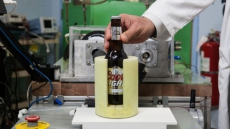Pollution control and remediation is all set to get smart in India, thanks to 'smart polymers' or new-age sensors that can sniff out cancer-causing substances in extremely minute traces and also help in removing them from the air or water sources.
The eco-friendly, cost effective 'smart polymer' technology is the brainchild of scientist R.J. Krupadam, who recently received the National Award for Technology Innovation in the field of Polymer Science and Technology from the ministry of chemicals and fertilisers.
According to Krupadam, the new method can distinguish between similar molecules and get an exact hit on the carcinogen that one wants to monitor - and that too in a swift manner as compared to conventional chromatographic methods.
These lab-designed substances were successfully applied to detect a group of compounds called polycyclic aromatic hydrocarbons (PAHs).
Classified as carcinogenic and mutagenic, PAHs are found in industrial emissions, automobile exhaust and smoke from burning wood, tobacco and charcoal.
Several PAHs are known to cause lung and skin cancer on long-term exposure.
"PAHs are released into the ambient air and water bodies due to fossil fuel combustion and industrial emissions, in particular hydrocarbon processing plants and oil refineries.
"The method proposed to detect PAHs is very sensitive and doesn't need much of a sample of the polluted source," Krupadam, a senior scientist at Nagpur's National Environmental Engineering Research Institute (NEERI), told IANS in an email interaction.
These super-sensory polymers also allow detection of other chemicals belonging to the same group of carcinogens with greater accuracy and sensitivity.
To give you an idea, standard processes measure contaminants in parts per million (ppm) or parts per billion (ppb).
One ppb is equivalent to one drop of impurity (pollutant) in 500 barrels of water.
Now, these smart polymers have a clear edge. They can detect traces in parts per trillion which translates to one drop of impurity in 500,000 such barrels.
Additionally, these can take up and hold in (absorb) the carcinogens, thereby acting as clean-up agents, for example, in oil slicks and water purification.
"These polymers are reusable... can be used more than 20 times and also they are environmentally benign," Krupadam said.
Currently, these are being produced at laboratory scale and pilot scale quantities. Krupadam said the next step is to scale them up to the kilogram level.
"Laboratory and pilot scale preparation of these sensory materials and absorbents is successful and we are looking for industry partnership for commercialisation," he said.





